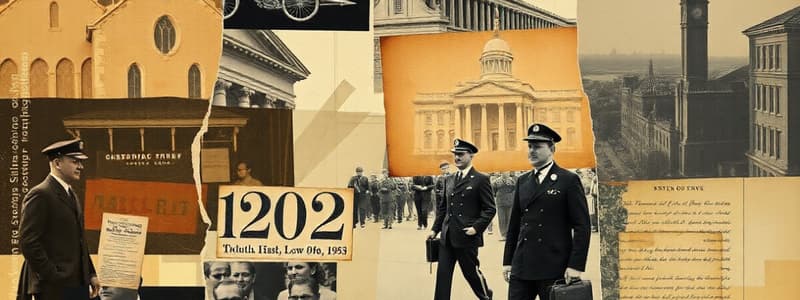Podcast
Questions and Answers
What was the primary purpose of the Declaration of Independence?
What was the primary purpose of the Declaration of Independence?
- To declare war on Great Britain
- To create a military alliance
- To explain the colonies' reasons for breaking away from Great Britain (correct)
- To establish a new government
What concept involves the people giving up some of their freedoms to be protected by the government?
What concept involves the people giving up some of their freedoms to be protected by the government?
- Divine Right
- Social Contract (correct)
- Checks and Balances
- Natural Rights
During which period did European thinkers emphasize the importance of facts and science?
During which period did European thinkers emphasize the importance of facts and science?
- The Renaissance
- The Middle Ages
- The Industrial Revolution
- The Enlightenment (correct)
Which individual served as the third president of the United States?
Which individual served as the third president of the United States?
What document outlines the agreement between a society and their government regarding individual rights?
What document outlines the agreement between a society and their government regarding individual rights?
Which of the following best describes the Enlightenment?
Which of the following best describes the Enlightenment?
What was a significant outcome of the social contract theory?
What was a significant outcome of the social contract theory?
Which period is known for significant changes in American diplomatic history?
Which period is known for significant changes in American diplomatic history?
Which group favored a strong central government and supported the ratification of the Constitution?
Which group favored a strong central government and supported the ratification of the Constitution?
What is the primary focus of the Federalist Papers?
What is the primary focus of the Federalist Papers?
Who were the authors of the Federalist Papers?
Who were the authors of the Federalist Papers?
What was the main argument of Anti-Federalists?
What was the main argument of Anti-Federalists?
Which individual is known as the first Secretary of the Treasury?
Which individual is known as the first Secretary of the Treasury?
What did the Federalists and Anti-Federalists primarily debate?
What did the Federalists and Anti-Federalists primarily debate?
What did the Federalists believe about the Constitution?
What did the Federalists believe about the Constitution?
Which document was crucial for the arguments supporting the ratification of the Constitution?
Which document was crucial for the arguments supporting the ratification of the Constitution?
Who was a prominent advocate for a strong central government in the early United States?
Who was a prominent advocate for a strong central government in the early United States?
What is the term for the system that divides power between national and state governments?
What is the term for the system that divides power between national and state governments?
Which concept emphasizes the importance of community engagement in government?
Which concept emphasizes the importance of community engagement in government?
What period is characterized by a sense of national unity and absence of partisan conflict in the U.S.?
What period is characterized by a sense of national unity and absence of partisan conflict in the U.S.?
What was the primary focus of the Monroe Doctrine?
What was the primary focus of the Monroe Doctrine?
Which early American politician was opposed to a strong central government?
Which early American politician was opposed to a strong central government?
What role did civic virtue play in the formation of the United States?
What role did civic virtue play in the formation of the United States?
Which term best describes the division of authority in United States governance?
Which term best describes the division of authority in United States governance?
Flashcards
Declaration of Independence
Declaration of Independence
A document explaining why the American colonies wanted to separate from Great Britain.
Social Contract
Social Contract
An agreement between the people and the government where people give up some freedoms to get protected rights.
Enlightenment
Enlightenment
A time when European thinkers emphasized facts and science.
Preamble
Preamble
Signup and view all the flashcards
Thomas Jefferson
Thomas Jefferson
Signup and view all the flashcards
American Colonies
American Colonies
Signup and view all the flashcards
Purpose of a Document
Purpose of a Document
Signup and view all the flashcards
Important Time Period
Important Time Period
Signup and view all the flashcards
Federal Government
Federal Government
Signup and view all the flashcards
States
States
Signup and view all the flashcards
Alexander Hamilton
Alexander Hamilton
Signup and view all the flashcards
Federalism
Federalism
Signup and view all the flashcards
Civic Virtue
Civic Virtue
Signup and view all the flashcards
Founding Fathers
Founding Fathers
Signup and view all the flashcards
Anti-Federalists
Anti-Federalists
Signup and view all the flashcards
Federalist Papers
Federalist Papers
Signup and view all the flashcards
What did Alexander Hamilton believe about the government?
What did Alexander Hamilton believe about the government?
Signup and view all the flashcards
What was the purpose of the Federalist Papers?
What was the purpose of the Federalist Papers?
Signup and view all the flashcards
What is the difference between Federalists and Anti-Federalists?
What is the difference between Federalists and Anti-Federalists?
Signup and view all the flashcards
Why were the Federalist Papers important?
Why were the Federalist Papers important?
Signup and view all the flashcards
Study Notes
Unit 1, Lesson 1
- Conclusion: A decision based on available information
- Corroboration: Using multiple sources to verify historical evidence
- Credibility: The quality of being trustworthy and believable
- Fact: Something proved true
- Historical Evidence: Information used to prove the truth of a historical argument
- Intended Audience: The person(s) for whom a source was originally created
- Interpretation: To explain the meaning of something
- Main Idea: The most important point in a document or source
Unit 1, Lesson 2
- Opinion: A judgment formed about something
- Bias: A person's preferences or prejudices
- Primary Source: A firsthand account of an event created by someone who experienced it (e.g., diary entries, speeches, documents)
- Secondary Source: An account created after an event based on primary sources (e.g., newspaper articles, academic journals, encyclopedias)
- Historical Context: The time period's political, social, cultural, or economic conditions
- Interpretation: A person's explanation or idea about something, often a historian's explanation of why or how something in the past happened
- Validity: Accuracy and truth of a source
- Point of View: A unique perspective on an issue or event
- Reliable: Trustworthy as a source of information
Unit 1, Lesson 3
- Causation: The relationship where one event is a direct result of another
- Cause-and-Effect Relationship: The connection where one event causes a subsequent event
- Claim: A statement that's not yet proven
- Conclusion: A decision based on the available information
- Correlation: A connection between events, but correlation doesn't imply causation
- Historical Causation: The process of identifying relationships between events in history
Unit 1, Lesson 4
- Historical Causation: Identifying relationships between historical events; there are often multiple causes for an event
- American Indians: People (past and present) whose ancestors lived in what is now the US for a long time
- Americas: All land in North, Central, and South America, and the islands of the Caribbean
- Ancestral Puebloan Culture: American Indian culture (approx 1 CE - 1300 CE) in the southwestern US who built complex houses and used water for crops
- Unit 2 (Starts on page 5)
Unit 2, Lesson 1
- Dutch Republic: Country in northern Europe (Netherlands)
- Indentured Servant: A person who agreed to work for someone for a set period without pay, often to pay off passage to America.
- Middle Passage: The journey enslaved people were forced to make across the Atlantic to America as part of the transatlantic slave trade
- Plantation: A large farm that typically grows one or two types of crops and relies on enslaved labor
- Puritan: A person from a religious group that broke away from the Church of England, valuing simple religious practices
- Quakers: A Christian religious group that believes in peace and equality of all people
- Slavery: A system where people are owned and forced to work against their will
- Triangular Trade: A trade pattern with Europe, Africa, and America where manufactured goods were exchanged for enslaved people who provided labor in the Americas
Studying That Suits You
Use AI to generate personalized quizzes and flashcards to suit your learning preferences.




